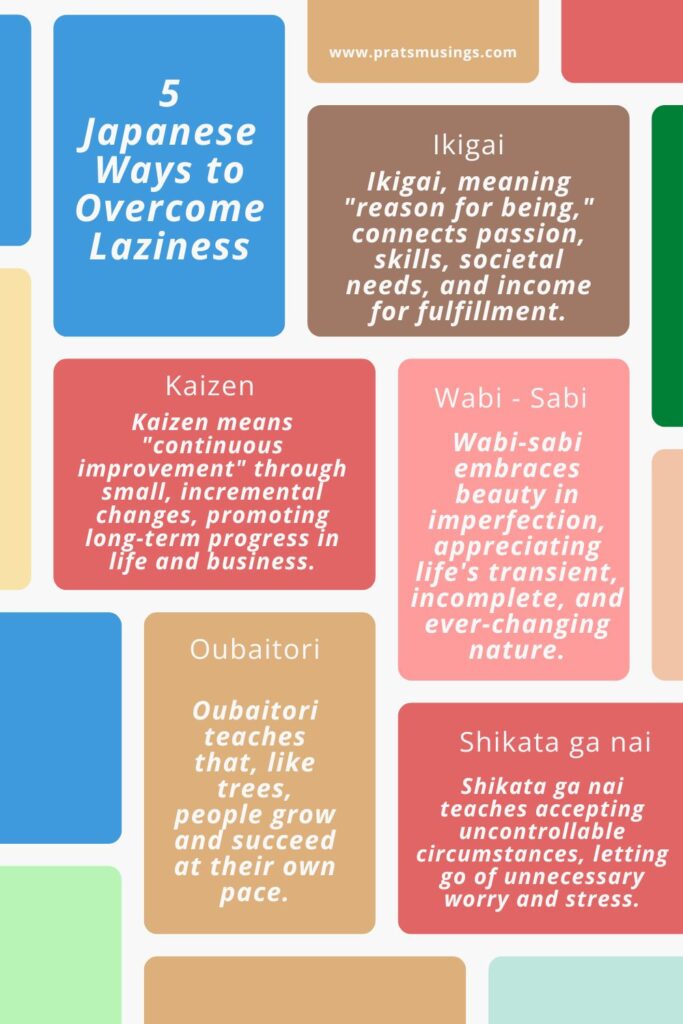Laziness, or the lack of motivation, can stem from many factors, including mental and emotional fatigue, lack of clear goals, or even being overwhelmed by daily life. Often, we find ourselves in a cycle where we know we need to be productive, but our energy and motivation don’t align. This can lead to frustration, guilt, and further inaction. Understanding the underlying reasons for laziness is crucial because it is often rooted in mental and emotional states rather than sheer indolence. Here are five Japanese ways to overcome laziness
The Japanese, renowned for their mindfulness and disciplined approach to life, have developed cultural concepts that can help us combat laziness and foster a more proactive lifestyle. Let’s explore five Japanese philosophies—Ikigai, Shikata ga nai, Wabi-sabi, Oubaitori, and Kaizen—each offering valuable lessons to help overcome laziness. Let’s look at these five Japanese ways to overcome laziness.
5 Japanese Ways to Overcome Laziness
Ikigai: Finding Your Purpose

Ikigai, which translates to “reason for being,” is one of the most powerful concepts for overcoming laziness. It refers to the intersection between what you love, what the world needs, what you are good at, and what you can get paid for. This concept is often linked to life satisfaction and longevity in Japan, particularly in regions like Okinawa, known for having the longest-living people in the world.
How Ikigai Helps Combat Laziness
We often need a clear sense of purpose or direction when we lack motivation. If you don’t know why you’re doing something, putting it off or avoiding it altogether is easy. By finding your ikigai, you gain clarity on your life’s purpose, which can ignite your inner drive. Working towards something meaningful creates a natural pull, reducing the resistance and laziness that often accompany tasks without clear significance.
To find your ikigai, consider these questions:
- What do you enjoy doing?
- What are your talents and strengths?
- How can you use those skills to benefit others?
- What can you potentially make a living from?
By answering these questions, you may identify a passion that aligns with your skills and societal needs, fueling your motivation to take consistent action and overcome laziness.
Shikata Ga Nai: Acceptance of What Cannot Be Controlled

Shikata ga nai, meaning “it cannot be helped” or “nothing can be done about it,” is a core principle in Japanese philosophy that teaches acceptance of things beyond our control. It’s not about resignation but rather recognizing the limitations of what we can influence and letting go of unnecessary worry.
How Shikata Ga Nai Helps Combat Laziness
Laziness often stems from the overwhelming nature of tasks or the fear of failure. We procrastinate when faced with uncertainty or when we doubt our abilities. The philosophy of shikata ga nai encourages us to accept the things we cannot control and focus on what we can do. This mindset removes the pressure to be perfect or to have everything figured out before starting a task, thereby reducing procrastination and mental paralysis.
For example, you might feel lazy because a project seems too daunting. Instead of focusing on the enormity of the challenge, practising shikata ga nai allows you to accept that some factors, such as outcomes or external circumstances, are out of your control. This acceptance frees your mind to focus on taking manageable steps without being burdened by the weight of the unknown.
Must Read: Japanese Philosophies You Must Follow
Wabi-Sabi: Embracing Imperfection

Wabi-sabi is the Japanese concept of finding beauty in imperfection and accepting the natural cycle of growth and decay. It encourages us to appreciate life’s transient, imperfect, and incomplete aspects.
How Wabi-Sabi Helps Combat Laziness
Perfectionism is one of the leading causes of procrastination and laziness. When we aim for flawless results, we often become paralyzed, fearing that our work will not meet the high standards we set for ourselves.
Wabi-sabi reminds us that imperfection is a natural part of life and that there is beauty in the process, regardless of the outcome.
By embracing wabi-sabi, we learn to appreciate the effort and progress, even if the result isn’t perfect. This mindset reduces the fear of failure, making it easier to start tasks without the pressure to perform perfectly. When you no longer fear mistakes, you’ll find it easier to take action, allowing you to overcome the paralysis that leads to laziness.

Oubaitori: Don’t Compare Yourself to Others

Oubaitori is a Japanese idiom that comes from four kanji characters representing different trees (cherry, plum, peach, and apricot). The concept teaches that as each tree blooms in its own time, people also grow and succeed at their own pace.
How Oubaitori Helps Combat Laziness
One of the most significant contributors to laziness is comparison. When we see others achieving more, we can feel inadequacy, which can lead to demotivation and procrastination.
Oubaitori encourages us to embrace our unique path without comparing ourselves to others. Focusing on your growth and journey can help you stay motivated and avoid the discouragement often from unrealistic comparisons. Laziness usually arises when we feel we aren’t living up to societal or peer expectations. However, recognizing that everyone’s progress happens at different speeds relieves the pressure and keeps you moving forward.
Kaizen: Continuous Improvement

Kaizen means “change for the better” and refers to the practice of continuous improvement. It’s a principle used in both personal life and business in Japan, encouraging small, incremental changes that lead to significant long-term improvements.
How Kaizen Helps Combat Laziness
Laziness is often the result of feeling overwhelmed by the scale of a task or goal. The kaizen approach counters this by breaking tasks down into small, manageable steps. Instead of aiming for drastic change or perfection all at once, kaizen focuses on making small, consistent improvements.
For instance, if you’ve been avoiding starting a project, the kaizen method suggests doing just a small part—whether working for 5 minutes or completing a minor task. Over time, these small efforts accumulate into significant progress. By reducing the scale of what needs to be done, kaizen makes tasks less intimidating, reducing the tendency to procrastinate.
Adopting a kaizen mindset helps eliminate the all-or-nothing mentality, which often leads to laziness. Progress, no matter how small, is still progress. The key is consistency and patience.
Conclusion
Overcoming laziness isn’t about forcing yourself to work harder but about understanding your mental and emotional blocks. Japanese cultural philosophies like ikigai, shikata ga nai, wabi-sabi, oubaitori, and kaizen offer profound wisdom for addressing the root causes of laziness and inspiring consistent action. By finding purpose, accepting imperfection, focusing on self-growth, and making continuous improvements, you can break free from the cycle of procrastination and inertia.
Incorporating these concepts into your daily life can help you foster a more motivated, mindful, and productive mindset, ultimately making it easier to overcome laziness and achieve your goals. These are the most sought after five Japanese ways to overcome laziness. Do you have your own method? Let me know in the comments.
Leave a Reply